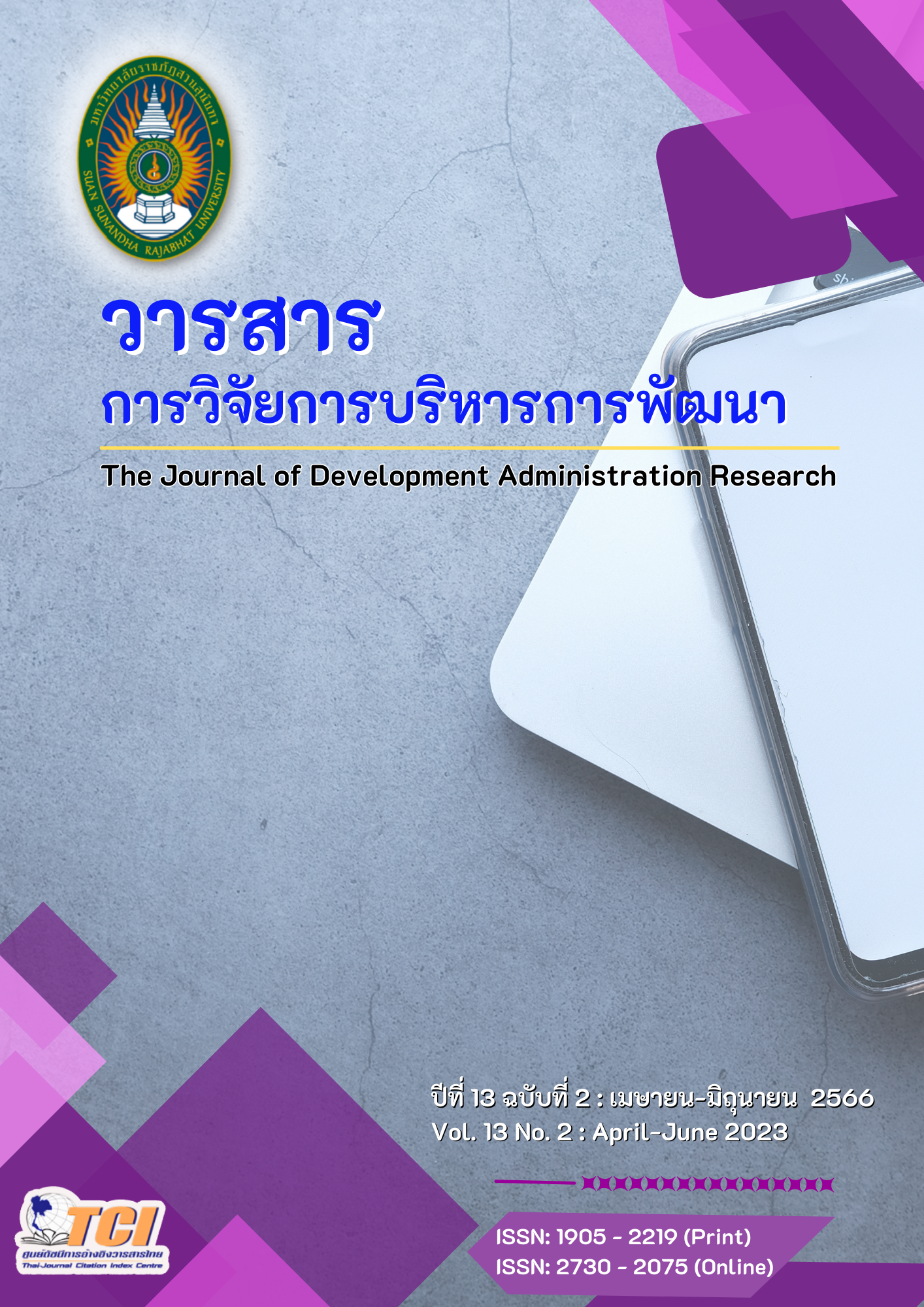ปัจจัยเชิงสาเหตุของการเปลี่ยนแปลงระบบด้านบัญชีที่ส่งผลต่อการเปลี่ยนแปลง การปฏิบัติงานด้านบัญชี
คำสำคัญ:
การวิจัยด้านบัญชี, การศึกษาและฝึกอบรมด้านบัญชี, นวัตกรรมการบัญชี, การเปลี่ยนแปลงระบบด้านบัญชี, การเปลี่ยนแปลงแนวปฏิบัติทางด้านบัญชีบทคัดย่อ
การศึกษาวิจัยมีวัตถุประสงค์ 1) เพื่อศึกษาปัจจัยเชิงสาเหตุที่ส่งผลต่อการเปลี่ยนแปลงระบบด้านบัญชีและการเปลี่ยนแปลงแนวปฏิบัติทางด้านบัญชี, 2) เพื่อศึกษาอิทธิพลของปัจจัยเชิงสาเหตุของการเปลี่ยนแปลงระบบด้านบัญชีที่ส่งผลต่อการเปลี่ยนแปลงแนวปฏิบัติทางด้านบัญชี, และ 3) เพื่อสร้างแบบจำลองของปัจจัยเชิงสาเหตุของการเปลี่ยนแปลงระบบด้านบัญชีที่ส่งผลต่อการเปลี่ยนแปลงแนวปฏิบัติทางด้านบัญชี ผู้วิจัยทำการเก็บข้อมูลจากการสัมภาษณ์และเก็บแบบสอบถามออนไลน์จากแผนกบัญชีของธุรกิจการบริการที่จดทะเบียนในรายชื่อของกรมพัฒนาธุรกิจการค้า กระทรวงพาณิชย์ ตั้งแต่เดือนกรกฎาคม 2564 ถึงกันยายน 2564 กลุ่มตัวอย่าง คือ ตัวแทนธุรกิจการบริการ จำนวน 420 ราย ตามการใช้การกำหนดขนาดของกลุ่มตัวอย่างโดยเทคนิคสถิติโมเดลสมการโครงสร้าง ผลการวิจัยระบุว่า การวิจัยด้านบัญชีส่งผลต่อการเปลี่ยนแปลงระบบด้านบัญชี, การวิจัยด้านบัญชีส่งผลต่อการเปลี่ยนแปลงแนวปฏิบัติทางด้านบัญชีผ่านการเปลี่ยนแปลงระบบด้านบัญชี, การศึกษาและการฝึกอบรมด้านบัญชีส่งผลต่อการเปลี่ยนแปลงระบบด้านบัญชี, การศึกษาและการฝึกอบรมด้านบัญชีส่งผลต่อการเปลี่ยนแปลงแนวปฏิบัติทางด้านบัญชีผ่านการเปลี่ยนแปลงระบบด้านบัญชี, เทคโนโลยีด้านบัญชีส่งผลต่อการเปลี่ยนแปลงระบบด้านบัญชี, เทคโนโลยีด้านบัญชีส่งผลต่อการเปลี่ยนแปลงแนวปฏิบัติทางด้านบัญชีผ่านการเปลี่ยนแปลงระบบด้านบัญชี, และการเปลี่ยนแปลงระบบด้านบัญชีส่งผลต่อการเปลี่ยนแปลงแนวปฏิบัติทางด้านบัญชี จากผลการวิจัย ธุรกิจการบริการ สามารถนำผลที่ได้จากการศึกษาวิจัยไปพัฒนาการวิจัย อีกทั้งพัฒนาระบบการจัดการบัญชีให้ก้าวหน้า ส่งผลให้ส่งเสริมการเปลี่ยนแปลงระบบและแนวปฏิบัติทางด้านบัญชีของแผนกบัญชีของธุรกิจการบริการได้
เอกสารอ้างอิง
Akyel, N. (2012). Forensic accounting training: a proposal for Turkey. Procedia - Social and Behavioral Sciences, 55(5), 77-86.
Boone, L., et al. (2018). Accounting for the impact of agricultural land use practices on soil organic carbon stock and yield under the area of protection natural resources - Illustrated for Flanders. Journal of Cleaner Production, 203, 521-529.
Busco, C. and Quattrone, P. (2018). Performing business and social innovation through accounting inscriptions: an introduction. Accounting, Organizations and Society, 67, 15-19.
Carlsson-Wall, M. and Kraus, K. (2015). Opening the black box of the role of accounting practices in the fuzzy front-end of product innovation. Industrial Marketing Management, 45, 184-194.
Changwony, F.K. and Peterson, A.S. (2019). Accounting practice, fiscal decentralization and corruption. The British Accounting Review, 51(5), 100834.
Channuntapipat, C., Samsonova-Taddei, A., and Turley, S. (2020). Variation in sustainability assurance practice: An analysis of accounting versus non-accounting providers. The British Accounting Review, 52(2), 556 – 580.
Chesney, T. (2017). Agent based modeling as a decision support system for shadow accounting. Decision Support Systems, 95, 110-116.
Constable, P. and Kuasirikun, N. (2018). Gifting, exchange and reciprocity in Thai annual reports: Towards a Buddhist relational theory of Thai accounting practice. Critical Perspectives on Accounting, 54, 1-26.
Duman, H., Apak, I., çerlia, M.Y., and Yücenursen, M. (2013). The entrepreneurs’ expectations and satisfaction level in today’s accounting education: a survey of Aksaray organized industrial zone. Procedia - Social and Behavioral Sciences, 103, 1059- 066.
Goldwater, P.M. and Fogarty, T.J. (1994). Expert system-driven accounting education: a summary of empirical findings on the reduction of professorial control. Accounting Education for the 21st Century, The Global Challenges, 1994, 253-263.
Gonçalves, T. and Gaio, C. (2021). The role of management accounting systems in global value strategies. Journal of Business Research, 124, 603-609.
Gunny, A. (2012). The process of long-term training in accounting (for Turkey). Procedia - Social and Behavioral Sciences, 46, 2738-2741.
Hadid, W. and Al-Sayed, M. (2021). Management accountants and strategic management accounting: The role of organizational culture and information systems. Management Accounting Research, 50(1), 100725.
Hart, D.M. (2009). Accounting for change in national systems of innovation: A friendly critique based on the U.S. case. Research Policy, 38(4), 647-654.
Laux, V. and Ray, K. (2020). Effects of accounting conservatism on investment efficiency and innovation. Journal of Accounting and Economics, 70(1), 101319.
Notte, A.L. and Rhodes, C. (2020). The theoretical frameworks behind integrated environmental, ecosystem, and economic accounting systems and their classifications. Environmental Impact Assessment Review, 80, 106317.
Rabès, A., et al. (2020). Greenhouse gas emissions, energy demand and land use associated with omnivorous, pesco-vegetarian, vegetarian, and vegan diets accounting for farming practices. Sustainable Production and Consumption, 22, 138-146.
Richardson, A.J. (2012). Paradigms, theory and management accounting practice: A comment on Parker (forthcoming) “Qualitative management accounting research: Assessing deliverables and relevance” Critical Perspectives on Accounting, 23(1), 83-88.
Sunder, S. (2010). Adverse effects of uniform written reporting standards on accounting practice, education, and research. Journal of Accounting and Public Policy, 29(2), 99-114.
Swanson, Z.L. and Gross, N.J. (1998). A comparison of academics’, practitioners’, and users’ perspectives toward the research of accounting practice. Critical Perspectives on Accounting, 9(4), 467-485.
Tingey-Holyoak, J., Pisaniello, J., Buss, P., and Mayer, W. (2021). The importance of accounting-integrated information systems for realizing productivity and sustainability in the agricultural sector. International Journal of Accounting Information Systems, 41(3), 100512.
Tiznado-Aitken, I., Mu˜noz, J.C., and Hurtubia, R. (2021). Public transport accessibility accounting for level of service and competition for urban opportunities: An equity analysis for education in Santiago de Chile. Journal of Transport Geography, 90, 102919.
Watanabe (1992). Accounting education and training in Japan. International Handbook of Accounting Education and Certification, 1992, 203-211.
Wells, P.K. (2018). How well do our introductory accounting text books reflect current accounting practice? Journal of Accounting Education, 42, 40-48.
Wolf, S.A. and Ghosh, R. (2020). A practice-centered analysis of environmental accounting standards: integrating agriculture into carbon governance. Land Use Policy, 96(6), 103552.
ดาวน์โหลด
เผยแพร่แล้ว
รูปแบบการอ้างอิง
ฉบับ
ประเภทบทความ
สัญญาอนุญาต
ลิขสิทธิ์ (c) 2023 วารสารการวิจัยการบริหารการพัฒนา

อนุญาตภายใต้เงื่อนไข Creative Commons Attribution-NonCommercial-NoDerivatives 4.0 International License.
บทความที่ได้รับการตีพิมพ์เป็นลิขสิทธิ์ของมหาวิทยาลัยราชภัฏสวนสุนันทา
ข้อความที่ปรากฏในบทความแต่ละเรื่องในวารสารวิชาการเล่มนี้เป็นความคิดเห็นส่วนตัวของผู้เขียนแต่ละท่านไม่เกี่ยวข้องกับมหาวิทยาลัยราชภัฏสวนสุนันทา และคณาจารย์ท่านอื่นๆ ในมหาวิทยาลัยฯ แต่อย่างใด ความรับผิดชอบองค์ประกอบทั้งหมดของบทความแต่ละเรื่องเป็นของผู้เขียนแต่ละท่าน หากมีความผิดพลาดใดๆ ผู้เขียนแต่ละท่านจะรับผิดชอบบทความของตนเองแต่ผู้เดียว




